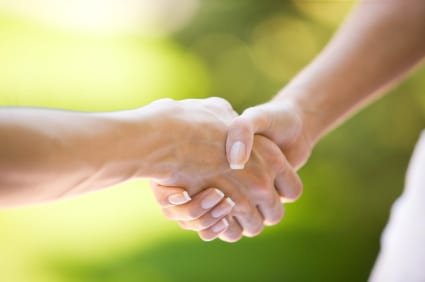 I recently read an article about the upcoming Summer Olympics. It said that British athletes have been advised not to shake hands with other players or dignitaries at the London Olympic Games for fear that they will pick up an illness and lose the opportunity to win a medal in the games.
I recently read an article about the upcoming Summer Olympics. It said that British athletes have been advised not to shake hands with other players or dignitaries at the London Olympic Games for fear that they will pick up an illness and lose the opportunity to win a medal in the games.
As a mom with a house full of kids who spread germs faster than they can send a text, I completely understand this concern. I know what it is like when all six of mine pass around the stomach flu, I can’t even imagine what that would be like to see a few thousand Olympians struggling to make it to the toilet at the Olympic Village.
Regardless of the fact that the summer is not typically known as “flu season,” most of us that have experienced the flu epidemic visiting our house know all to well that it likes to show up at the most unexpected times. Like the day before a vacation, in the middle of a school play or in this case, during the summer Olympics. I remember years ago, I think it was the Duke football team who came to play FSU. Someone on their team had the flu and the next thing you know both teams are down for the count. Trust me, I get their concern.
Did you know that handshaking goes as far back as the 2nd century B.C.? Shaking someone’s hand was a way to show that you did not hold a weapon. In this day and age I swear that I would be more concerned that turning down a handshake could come across like an insult and lead to someone pulling a weapon. If the Olympians cannot shake hands with their competitors and with the dignitaries who have come from all over the world for this event, what should they do?
I brought it up with the kids one night at the dinner table. Who knows why, it is not as if the British Government was asking the Newsome Family for suggestions on how to greet people. But I figured that since I am like a broken record constantly reminding my kids to “look adults in the eyes and shake hands firmly when being introduced to them,” that maybe they would have some thoughts on the subject. I told them my idea was that perhaps the athletes could do a respectful nod of the head to each other. That was met with lots of groans and rolling of the eyes. Apparently, I should have known that Olympic athletes would “die of embarrassment” if they had to do that.
As they threw out their ideas, I almost started laughing. All I could think of was what it would look like if I saw people greeting each other at the grocery store in any of the following ways they thought of. The first idea shouted out was to greet each other with a fist bump. I nixed that because you would still be technically “touching” hence the possibility of spreading germs. Plus an example of this fist bump left one of the kids in tears. A chest bump was suggested like the football players do after scoring a goal, once again I shot down that idea. Having just had surgery on my chest, I don’t want anyone bumping it. I’m pretty sure my doctor would have put that on the “things not to do for six weeks” list. Air kisses, bowing, fake high-fives, and the ever popular elbow bump were suggested as well.
After finding it necessary to call a time-out at the dinner table because they kept using each other to show me what they meant by a “bump” greeting and an “air” slap (which seemed to conveniently land on one of their siblings making them feel it necessary to return the greeting), one of them said something that made sense.
Like the ever brilliant 11-year-old she is, my daughter pointed out the obvious thing that adults sometime forget. Touch is what connects us. Studies have shown that jurors are more lenient with a defendant when they see the lawyer place their hand on the defendant’s shoulder. Nothing melts the heart of a parent than seeing your child and his or her teammates give each other hugs after winning or losing a big game. As a country, we have found hope in the darkest moments in history when we see complete strangers standing hand in hand, supporting each other.
Shaking hands, giving high fives, elbow bumps, hugs and kisses are all simple ways that we are able to show a simple expression that we care. Why would we ever want to stop people from doing that?” she asked. “Especially when we have soap, water and hand sanitizer that can kill the germs!”
Pretty basic huh? Germs are all around us, in far many more places than our skin. That is always going to be a fact of life. Perhaps, instead of doing away with a handshake, we could simply give each athlete a bottle of hand sanitizer and have them use that after greeting all the other players and dignitaries. The Olympic Committee could even do a quick hand-washing demonstration for all of the athletes. There would be no need to worry about a language barrier, the technique is universal.
The more I think about it the more I think that it really is too bad that the British Government didn’t come to the Newsome Family for some suggestions. I have an 11-year-old that came up with a very simple solution so that we can continue the tradition of spreading love and not worry about spreading the germs.





